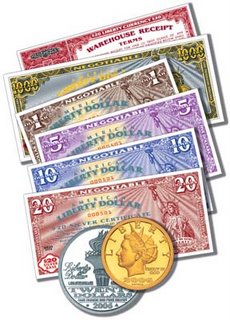U.S. Mint claims use of Liberty Dollars as currency is a "federal crime"
Yesterday, the US Mint announced that using Liberty Dollars, private currency backed by gold and silver, as money is a federal crime. Despite comments over the years by the Treasury Department, the Secret Service, and the Federal Reserve claiming there is nothing wrong with minting Liberty Dollars, the Mint states:
Under 18 U.S.C. Section 486, it is a Federal crime to pass, or attempt to pass, any coins of gold and silver intended for use as current money except as authorized by law. According to the NORFED website, "Liberty merchants" are encouraged to accept NORFED "Liberty Dollars" medallions and offer them as change in sales transactions of merchandise or services.It looks incriminating to me! Let's go to 18 USC 486. It sure looks the same as the US Mint. But looking at it closely, I see the words, "except as authorized by law". What did it mean when it used the term "law"? Does it mean the Constitution? The Constitution, in Article VI, Clause 2, is "the supreme Law of the Land". Let's start from there.
The US Mint says, "[U]nder the Constitution (Article I, section 8, clause 5), Congress has the exclusive power to coin money of the United States and to regulate its value." But, in looking at Article I, Section 8, Clause 5, there is no "exclusive" anywhere. If that word was there, the Federal Reserve (a private company) would be unconstitutional (the Federal Reserve IS unconstitutional, but not from this). It only says Congress has the power to coin money, but that anyone else can do it too.
But there is another part of the Constitution that has to do with money, which the US Mint doesn't refer. It is Article I, Section 10, Clause 1. It reads (in part):
No State shall...make any Thing but gold and silver Coin a Tender in Payment of DebtsThis means that any state can accept any currency they want, but they can't accept "legal tender" except gold and silver. The phrase "legal tender" is a legal term which means money that must be accepted by a creditor when offered by its debtor. The creditor may accept any money he wants, but he must accept legal tender when offered as payment, or the debt is wiped clean. In other words, to make Federal Reserve notes (FRN: fiat-paper money, backed by the full faith and credit of the United States government; i.e., nothing) to be a "legal tender" (in the Constitution, only gold and silver can be legal tender) is unconstitutional. But we accept FRN as the preferred currency of the USA.
However, NORFED answered back:
Claudia Dickens, spokeswoman for the US Treasury Department's Bureau of Engraving and Printing, said,We privately mint currency that is backed by gold and silver, not the United States Government. The designs and verbiage on our specie and certificate are original and are not copies of any US Mint currency.
The Liberty Dollar began in 1998 and has been in circulation throughout the US for eight years. We have over 2500 Liberty Associates, 75 Regional Currency Offices, and thousands of Liberty Merchants accepting the Liberty Dollar. We have never been notified nor had suit brought by the DOJ.
"There's nothing illegal about this. As long as it doesn't say legal tender, there's nothing wrong with it"Andrew Williams, a spokesman for the Federal Reserve in Washington D.C., said,
"There is no law that says goods and services must be paid for with Federal Reserve notes. Parties entering into a transaction can establish any medium of exchange that is agreed upon."Art Rolnick, Director of Research for the Federal Reserve Bank of Minneapolis, said,
"If these (NORFED) people want to issue their own money, so be it."
And there you have it. As Mahatma Gandhi said, "First they ignore you, then they laugh at you, then they attack you, then you win." According to the US Mint, there's three down, and one to go!

UPDATE: After careful reaserch, I was mistaken. "Legal tender" is not the same as "tender", as I once believe. The definition of "legal tender" is above. The definition of "tender" is money (or something of value) to satisfy a debt or obligation. In Article I, Section 10, Clause 1 (in question), that means states will only accept gold and silver to pay your debts. The federal government (not the state governments) will make money (i.e., ArticleI, Section 8, Clause 5), but the states will only accept gold and silver as tender. If you have obligations to the state government (e.g., taxes, tickets, fees, etc.), then states must fulfill your obligations only though gold and silver coins. Today, every state will only accept Federal Reserve notes in payment, so that makes them unconstitutional.


0 Comments:
Post a Comment
<< Home